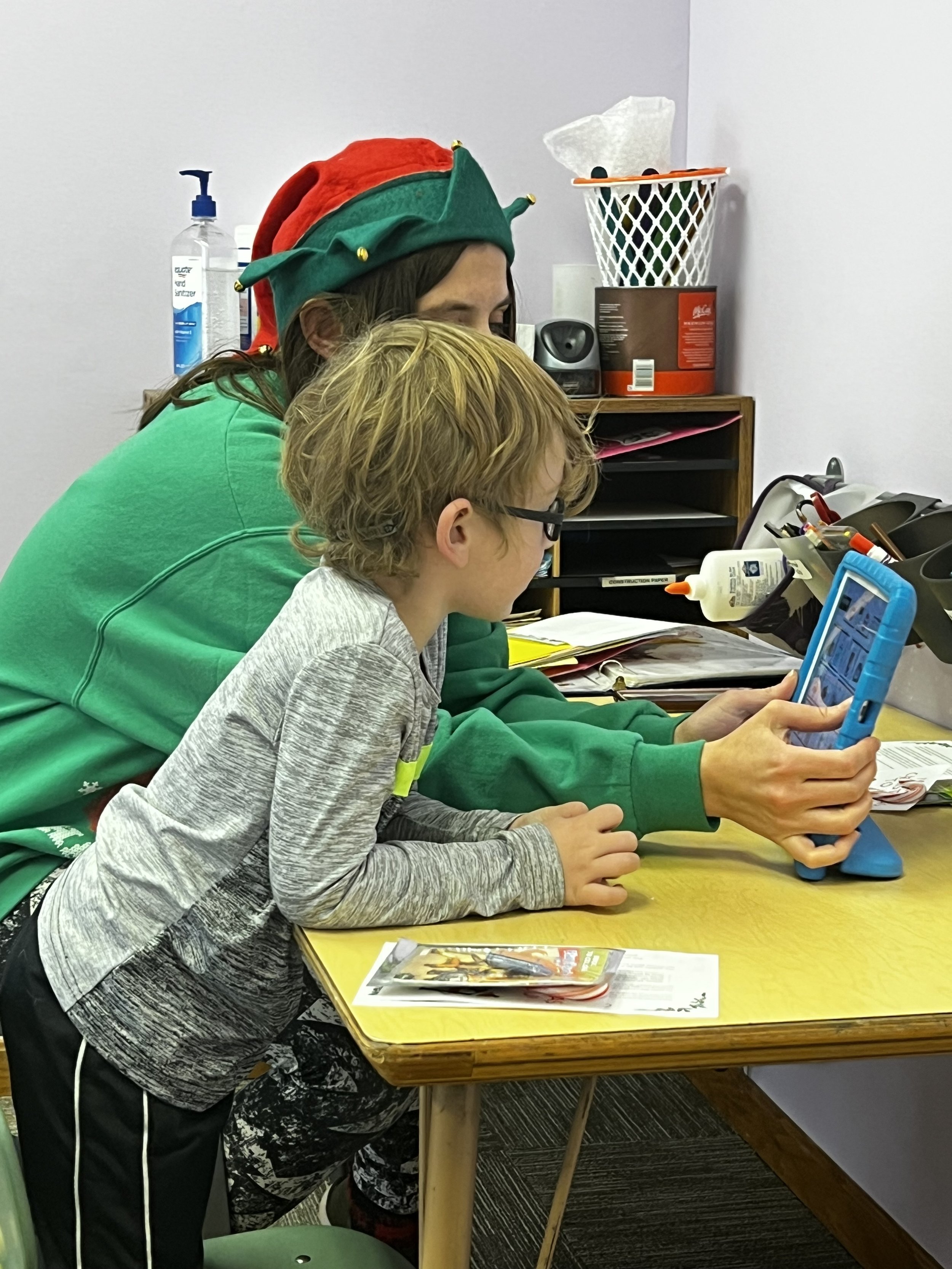
In-School versus Outpatient Speech Therapy
Speech therapy can occur in different settings, including in-school and outpatient or clinic settings. In-school services and outpatient services are available, however they will need to qualify. There is a different process to qualify for in-school speech services and outpatient services. In some cases, children may qualify for both in-school and outpatient services. Here are some key differences between these two types of services and when each may be appropriate.

Aided Communication
Aided language modeling or stimulation is a language intervention technique that uses augmentative and alternative communication (AAC) devices to facilitate communication in children with limited or no functional communication. SLPs can use this aided communication technique in therapy, or parents can implement this in day-to-day life. Aided communication is demonstrated in context to present an augmented interaction model using the AAC device as the main mode of communication for the child.

What are AAC devices?
AAC devices, or Augmentative and Alternative Communication devices, help individuals with difficulty communicating verbally. Children who struggle with verbal communication can include children with speech and language disorders, as well as those with physical disabilities that affect their ability to speak.

More Games to Boost Executive Function Skills
Executive function skills refer to a set of cognitive processes that help us manage our thoughts and actions effectively. These skills are essential for success in school, work, and life in general. Fortunately, there are many fun and engaging games that can help develop executive function skills

Improving Executive Function Skills in Children through Games
Executive function skills are essential mental processes that help individuals regulate, control, and manage their thoughts, actions, and emotions. These skills are crucial for success in school, work, and daily life. As a parent, you may be wondering how to enhance your child's executive function skills. The good news is that games can help children develop these critical mental processes while having fun and engaging in enjoyable activities.

Great Physical Therapy Toys
Toys can be an effective tool in pediatric physical therapy as they can motivate and engage children in therapeutic activities. We use toys frequently as they make physical therapy more engaging and fun. Toys can help children stay motivated and make their therapy sessions more enjoyable.

Toys to Help with Occupational Skills
Toys can be a valuable tool in occupational therapy for children. Depending on the child's needs and goals, different toys can be used to improve fine motor skills, hand-eye coordination, sensory processing, and more. For example, puzzles can help with problem-solving and cognitive skills, while building blocks can improve hand strength and dexterity. Sensory toys like play dough or kinetic sand can provide tactile stimulation and help with sensory processing. Playing with toys can also encourage social skills and communication, as children may play together and interact with each other. Overall, incorporating toys into occupational therapy can be both fun and effective for children.

Toys For Learning Speech
A frequent question we get is what toys will help my child learn language? The good news is that many toys can be utilized for encouraging language development!

Working with Teachers as an In-School Therapist
Communication and collaboration may seem complicated, as therapists and teachers may be busy and overwhelmed. Communication and collaboration can become even more complicated when a therapist treats in multiple schools. However, working with teachers inside and outside the classroom should be considered part of a child's treatment and a crucial one at that.

In-School vs. Clinical Pediatric Occupational Therapy
Why does my child not qualify for in-school services if they get occupational therapy at an outpatient clinic?
My child already gets OT in school. Do they still need outpatient therapy?
These are common questions parents ask regarding occupational therapy. However, trying to get the best treatment for your child or understanding how best to help them may feel frustrating or overwhelming. The first step is to understand the difference between school and clinic OT.

Occupational Therapy’s Role in Reflex Integration
Primitive reflexes are those reflexes that develop in a newborn to help a child survive and develop. These primitive reflexes integrate at a certain period in a child’s development as they no longer need to automatically turn their head towards a food source or startle and hold on to their mother, for example. When the reflexes do not integrate, they can, in some cases, significantly affect a child's motor skills and cause sensory sensitivity.

Primitive Reflexes and How They Can Affect Your Child
Primitive reflexes are those reflexes that develop in a newborn to help a child survive and develop. These automatic movements are necessary for helping a child navigate the world around them when their brain is still developing. Primitive reflexes integrate or dissipate, at a certain period in a child’s development as they are no longer needed.

Snowman Craft
What better way to prep for the holidays than by sitting down and doing a craft together as a family? This craft is not only adorable, it also targets some key fine motor skills! Enjoy this fun winter or Christmas craft with your family this weekend.

Fun Christmas Activities for Your Kids
Christmas time is coming up fast, and keeping the kids busy can be exhausting for many parents. The ideas listed below are very easy things to do to keep your kids busy and occupied while having fun; all the while, we parents can get what needs to be done, done. Of course, feel free to join your child in these activities. They will love it, or set them up and let them go!

Sensory Processing Around the Holidays
Christmas is a time of joy, family, friends, presents, beautiful lights, decorations, crafts, holiday gatherings, and more! However, this season can be challenging if your child struggles with sensory processing. Taking time to prepare for an accommodate these sensory issues can make the holidays for enjoyable for both you and your child. Keep reading to discover how to help your child have the best Christmas!

Christmas Gift Guide
Christmas is around the corner and gift buying for your little ones can be tricky.Instead of asking yourself “What do I get my kid” this year, let me help you! I put together a list of my favorite toys as a speech language pathologist that can promote language with your help of course. On the list I put together, you will notice a theme of hardly any electronic toys! This is important. Children need social interactions with others and not with their toys to build their language skills. Being present and playing with these toys with your child is super important.

Utilizing Sensory Books for Feeding Therapy
Feeding therapy has many pieces to it. Occupational therapists deal with the sensory component of feeding therapy, while a speech language pathologist will look at the oral-motor component. Feeding is an important occupation in the daily lives of children, and thus it is important for OTs to work on a child’s self-feeding and food acceptance.

What is Feeding Therapy?
Feeding therapy is a type of intervention to help children who are struggling eaters. Feeding therapy is often directed by a team of an occupational therapist and a speech therapist who have undergone the specific training. It addresses the sensory and oral motor parts of eating that may affect how a child consumes food.

Utilizing the Complexity Approach in Speech Therapy
The complexity approach is a method of choosing treatment targets to make therapy more efficient by promoting system-wide change or phonological learning on a broader scale. It is used to treat phonological disorders.

Phonology and Phonological Disorders
Speech therapy deals with speech sound disorders, an umbrella term for many speech issues, including phonological and articulation disorders. We’ve already discussed the importance of articulation, but what is the difference between articulation and phonology? Keep reading to find out!
